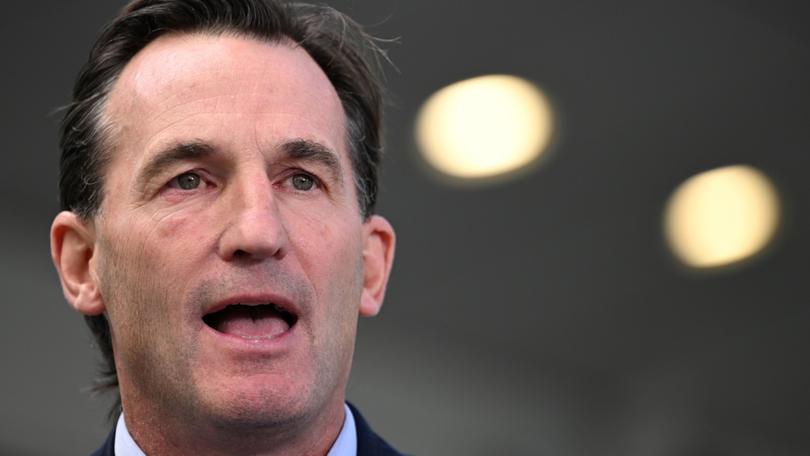Sport Integrity Australia to investigate AFL drug testing claims made by Federal MP Andrew Wilkie
Sport Integrity Australia will investigate claims about controversial illicit drug tests in the AFL, but the league remains “unapologetic” about giving club doctors the power to withdraw players from games.

Sport Integrity Australia will investigate allegations about controversial illicit drug tests in the AFL, but the league remains “unapologetic” about giving club doctors the power to withdraw players from games if they are at risk of testing positive on match days.
Federal MP Andrew Wilkie told parliament on Tuesday of bombshell allegations made by former Melbourne club doctor Zeeshan Arain, ex-Demons president Glen Bartlett and Shaun Smith, father of current player and alleged drug trafficker Joel Smith.
Wilkie said the trio had alleged players who tested positive to secret, off-the-books tests had been told to fake injuries and pull out of games in order to avoid match-day testing by SIA.
Sign up to The Nightly's newsletters.
Get the first look at the digital newspaper, curated daily stories and breaking headlines delivered to your inbox.
By continuing you agree to our Terms and Privacy Policy.They also claimed the clandestine test results were never shared with SIA or the World Anti-Doping Agency (WADA).
On Wednesday, SIA confirmed it has “commenced an assessment of allegations” made by Wilkie but would not comment further.
“Sport Integrity Australia can confirm it has commenced an assessment of allegations made by Federal MP Andrew Wilkie under parliamentary privilege this week,” the statement read.
AFL chief executive Andrew Dillon later released a statement welcoming the investigation.
“I spoke to David Sharpe from Sport Integrity Australia earlier today and the AFL supports SIA’s role in being asked to assess the claims made under parliamentary privilege by Andrew Wilkie MP,” he said.
“We encourage Mr Wilkie to pass on all the documents in his possession to SIA and look forward to working with SIA and providing any further information on the AFL Illicit Drug policy and its objectives and operation.”
Earlier, Dillon declared “a commitment to player wellbeing and welfare” was at the core of the league’s illicit drugs policy, which was introduced in 2005.
Dillon said the league was working with the AFL Players Association to improve the system, which is designed to change player behaviour, and is adamant the approach to positive tests is a matter of player health and safety.
“We are unapologetic about club and AFL doctors taking the correct steps to ensure that any player who they believe has an illicit substance in their system does not take part in any AFL match and that doctor-patient confidentially is upheld and respected,” Dillon told reporters on Wednesday.
“The medical interests and welfare of players is a priority for the AFL given everything we know about the risks facing young people generally and those who play our game in particular.”
Dillon confirmed urine tests have been part of the illicit drugs policy “for some time”.
“Doctors may use those urine tests to obtain any immediate results to determine whether any illicit substance remains in a player’s system,’‘ he said.
“If the test shows a substance is still in the player’s system, a doctor will take steps to prevent a player from taking part in either training and/or an AFL match both for their own health and welfare, and because having illicit substances in your system on match day may be ... a breach of the Australian Football Anti-Doping Code.”
Dillon said the clinical intervention tests will continue to happen.
“We don’t want our players, if there’s a chance they might have a substance in their system, we don’t want them training and we don’t want them taking part in matches for their health and welfare above anything else,” he said.
Dillon stressed positive tests related to a “small handful of the 1300 athletes that we have across the AFL and AFLW’‘, and insisted the league is “a safe place for our players to be”.
Asked if there should be repercussions for misleading the public regarding player injury status, Dillon referred to medical information being a private matter and said detailing the number of players who tested positive for illicit drugs is not in the public interest.
The AFL does not provide that information under its current illicit drugs policy, which is under “ongoing” review.
Dillon refused to put a time-line on when the review will be completed, other than stressing it needs to be “fit for purpose for 2024 and 2025 and beyond”.
Dillon noted the addition of AFLW players to the policy is “certainly on the table” under the review.
On Tuesday, Wilkie described “deeply troubling allegations of egregious misconduct within the AFL” from Arain, Bartlett and Smith as credible and detailed - and provided signed statements identifying the sources of the documents.
“If there are no illegal drugs in the player’s system they are free to play, and if there are drugs in their system the player is often asked to fake an injury,” Wilkie said.
“They are advised to lie about a condition, while the results of the off-the-book tests are kept secret and are never shared with Sports Integrity Australia or WADA.”
He said Arain alleged it wasn’t a club-specific issue at Melbourne, but an “AFL problem”, with a number of players arriving at the Demons with pre-existing cocaine dependencies.
Melbourne coach Simon Goodwin, Essendon counterpart Brad Scott and Sydney’s John Longmire all denied knowledge of the alleged secret tests and players faking injuries on Wednesday.
Goodwin said all clubs would demand more information from the AFL.
